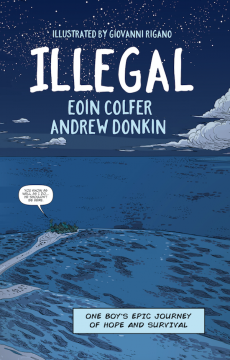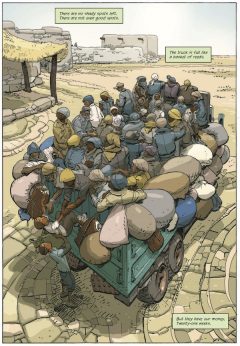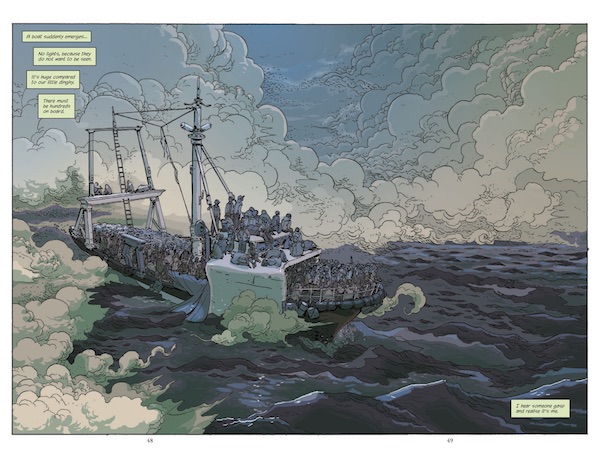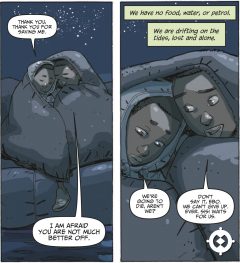“When you see statistics about boats sinking it’s hard to remember that every one of those numbers is a human being” Andrew Donkin discusses the real world inspirations for his and Eoin Colfer’s graphic novel Illegal
After seeing news stories of fishing boats capsizing in the Mediterranean in 2014, writers Eoin Colfer and Andrew Donkin were inspired to turn this tragedy into a graphic novel in order to inform readers about the migrants’ plight. Teaming up with artist Giovanni Rigano (with whom they had adapted Eoin’s Artemis Fowl books) their graphic novel ILLEGAL would go on to win multiple awards and so we were keen to find out the story behind this powerful and poignant tale (read our full review here). We caught up with writer Andrew Donkin to learn more:
 ILLEGAL follows the story of a pair of brothers who leave their village in Africa and try to make a new home for themselves sin Europe, can you tell us a bit about the inspiration for the story?
ILLEGAL follows the story of a pair of brothers who leave their village in Africa and try to make a new home for themselves sin Europe, can you tell us a bit about the inspiration for the story?
Andrew Donkin: The inspiration for the story of ILLEGAL came from Eoin and myself reading newspaper reports of boats sinking and lives lost in the Mediterranean Sea. This was back in 2014 when most of the reports were the size of a postage stamp on page 27 of the broadsheets. We were shocked that such things were happening on the doorstep of Europe.
Was it based on true events or were there any specific events that happened which you used as the framework for the story? (The screen with the fishing boat towards the end feels very much anchored in a real world event?)
AD: Every single element of the story of ILLEGAL is true and is taken directly from the real world. We spoke to people that had made that incredible journey and while our main character is fictional, every single thing that happens to Ebo is real. All those events, being abandoned in the Sahara Desert, to the boat crossing, to working to save the money to pay people traffickers, all those details are real and have happened to thousands of people.
Did you have to do much research into the mechanics of people trafficking and the journey which people go through in order to make it accurate and believable?
AD: Eoin, myself, and Gio did more research for this book than another we’ve ever written. It’s a very serious issue and we wanted to get every detail as accurate and true to life as we possibly could. We spoke to many people: refugees, migrants, aid workers. We also worked with and had guidance from two fantastic charities: Women for Refugee Women and Migrant Voice.
You’ve previously worked with Eoin on his Artemis Fowl adaptations, but was it different working on a completely new project together?
AD: It was very exciting working on a new original project. Myself, Eoin and Giovanni had already collaborated on hundreds and hundreds of pages of comics before even the first panel of Illegal was written.
 How did you and Eoin work on the story? Was it a collaboration in the same room, or did you fire back different drafts of the story via email to each other and build it from there?
How did you and Eoin work on the story? Was it a collaboration in the same room, or did you fire back different drafts of the story via email to each other and build it from there?
AD: When we’re starting a project we will get together in the same room in Dublin or London to work on it together. When we have the shape and feel of the story then once we start writing drafts of the script we’ll do those and fire them back and fourth over email. Always trying to improve the words.
Did you always have him in mind when you were developing Illegal? And was he involved in the creative process as much as you and Eoin?
AD: Yes, we knew ILLEGAL was always going to be a project for the three of us. We very much enjoy working together. Gio was involved from the earliest time on the project. I think we pitched him the first paragraph we had. Giovanni lives in Italy where the refugee / migrant issue is even further up the agenda than it is here if that’s possible.
What made you choose to tell the story in graphic novel format? What do you think that format allows you to do with the story that a prose novel or other format couldn’t?
AD: We always knew that it was going to be a graphic novel for three reasons:
Firstly we all love comics and telling stories in comics. All three of us grew up reading comics and we absolutely love making them.
Secondly, we knew that by telling the story of Ebo and his brother as a graphic novel it would reach a slightly different audience than if we had done it as a prose book. It was an audience we were keen to reach.
Thirdly, we didn’t want to TELL you what Ebo and his brother are feeling. We wanted to SHOW you what was happening to them and then invite the reader to decide what they might be feeling.

Although the story is very serious, it also feels like it has a lightness to it as well. Whether it’s the banter with the brothers or the style of the artwork. Was it important for you to bring a bit of levity to the story in order to prevent it from being too harrowing – and also to allow the more emotional moments a chance to really get some impact?
AD: Indeed. That perfectly sums up what we were attempting to do. The boys are brothers and even in the grimes of situations, close friends will find some humour, even if it’s fairly dark humour. The book is about a very serious issue, but we also wanted it to be an exciting read and to have moment of lightness.
 Did it affect you writing such an emotional story? (It certainly affected me when reading it!).
Did it affect you writing such an emotional story? (It certainly affected me when reading it!).
AD: It certainly did. It’s impossible not to be really moved when you meet people that have completed the journey (usually over several years) that Ebo undertakes.
What would you like people to take away from reading Illegal, and how can people help this kind of story from happening again and again?
AD: One reason we wanted to write ILLEGAL was to remind our readers that when you see statistics about boat sinking and lives lost in the newspapers, it’s often hard to remember that every one of those numbers is a human being. We wanted to tell the story of one of those people in the hope of maybe giving more of a human face to all the people lost as just numbers.
How can people help this kind of story from happening again and again?
AD: It’s very tricky as to what any one person can do to stop this kind of story happening again. What people can do is get involved with their local charity that helps refugees in their local area. Mine for example is Greenwich Migrant Hub. Most areas have one if you look. That’s a way that people can make a real practical difference in their own area.
You can purchase Illegal from Amazon for £10.49 and you can find out more about Andrew’s work at www.andrewdonkin.co.uk



October 8, 2025 @ 9:16 am
You’re so awesome! I don’t believe I have read a single thing like that before. So great to find someone with some original thoughts on this topic. Really.. thank you for starting this up. This website is something that is needed on the internet, someone with a little originality! Catch bbc persian live radio — in‑depth reports and documentaries. live bulletins and interviews. analysis programs, feature stories. reliable HD stream on any device.
December 20, 2025 @ 7:42 am
Neben modernen Online-Slots findest du auch eine große Auswahl an klassischen Tischspielen. Im Casino
Shuffle kommt jeder Fan von Glücksspielen auf seine Kosten. Hier kannst du an Poker-,
Blackjack- oder Roulette-Tischen spielen. Diese mobile Webseite funktioniert nahtlos
auf allen Geräten und ermöglicht unterwegs spielen ohne App-Download.
Mit einer riesigen Auswahl an Spielen, attraktiven Boni und einem dedizierten Kundensupport bieten wir ein erstklassiges Spielerlebnis.
Du kannst direkt über den Browser spielen, ohne eine App herunterladen zu müssen.
Bei Shuffle können Sie Casino-Spiele von den besten Anbietern der
Branche spielen, darunter Hacksaw Gaming, Pragmatic Play, NoLimit City, Push Gaming, Play’n Go, Relax Gaming, BGaming, Evolution und mehr.
Erleben Sie das ultimative Live-Casino-Erlebnis
bei Shuffle, mit echten Dealern und in Echtzeit, während Sie unterhaltsame Spielshows spielen oder bei Blackjack
und anderen Live-Dealer-Spielen gewinnen. Sie haben auch die
Möglichkeit, die großen Gewinne mit nach Hause zu nehmen, indem Sie Jackpot-Slots spielen und
einen festen oder progressiven Mega-Jackpot knacken. Die Spiele bei Shuffle
sind einfach und bequem von zu Hause aus zu spielen, einige davon sind
bereits aus landbasierten Casinos bekannt, wie Slots, Roulette,
Blackjack, Baccarat und andere Tischspiele. Bei Shuffle
haben Sie Zugang zu Tausenden von verschiedenen Spielen, die Sie dank der Implementierung von Kryptowährungen in Sekundenschnelle spielen können.
Unsere Priorität ist es, dir ein sicheres und unterhaltsames Umfeld zu bieten, in dem du dich voll
und ganz auf dein Spiel konzentrieren kannst.
References:
https://online-spielhallen.de/1go-casino-aktionscodes-ihr-schlussel-zu-exklusiven-vorteilen/
December 26, 2025 @ 8:36 pm
All the top Australian casino sites we recommend meet
these standards, making it easy for you. These are perfect for players who enjoy competition and want more excitement than just spinning the reels solo.
Table games like blackjack and baccarat might be your go-to.
Casinonic drops a solid A$7,500 in bonus cash and gives you access to 700+ jackpot pokies, including high-volatility options that reward patience
and timing. It ranks among the best Bitcoin casinos, where you
get A$8,000 + 400 free spins welcome package for a strong start.
Neospin is the best Australian casino online.
The most secure platforms follow licensing standards
and use advanced technology to protect user data and ensure fair play.
We perform multiple tests on (iOS and Android) smartphones and tablets to see directly how well or poorly
a casino works on mobile systems. However, we also examine the deposit and withdrawal limits and
possible fees. When we see that a casino has partnered with some or all of these providers we know the operator is
legit. Anti-fraud and anti-money laundering policies are always
welcome and create a feeling of security from malicious practices.
References:
https://blackcoin.co/woospin-premier-pokies-paradise-for-aussie-players-in-2025/
December 27, 2025 @ 1:06 am
Video poker sites often have dozens of different variations of the game.
Video poker machines can be found in gaming venues
and even in occasional shops around the world. The
game thus exists in many variations and can benefit one side or the other.
Blackjack is a card game whose rules can vary in a non-obvious way.
Rocketplay Casino fully supports cryptocurrency,
giving players access to Bitcoin, Ethereum, Litecoin, Dogecoin,
Bitcoin Cash, and Tether. While Rocketplay’s main focus is casino
gaming, sports betting may be available in certain licensed regions.
Clear game history displays and trend tracking tools enhance the
experience without affecting random outcomes. Many versions also provide built-in strategy guides
to help players refine their gameplay. These games allow for strategy and skill,
making them a great choice for those who prefer more control than slots provide.
Rocketplay’s table games section is packed with classics, offering multiple variants to suit all skill levels and betting
styles.
References:
https://blackcoin.co/welcome-to-vegasnow-casino-australia-in-depth-review/
December 29, 2025 @ 6:09 am
online roulette paypal
References:
http://www.maumrg.com
December 29, 2025 @ 6:33 am
online poker real money paypal
References:
https://suryapowereng.in/employer/paypal-gambling-sites-2025-best-operators-with-paypal-payments/
February 5, 2026 @ 11:44 am
accelerated 2nd degree nursing programs https://otvetnow.ru foreign corrupt practices act policy
February 5, 2026 @ 9:25 pm
https://askoff.ru